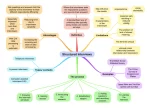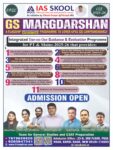
|
When considering the array of 51 optional subjects for the UPSC Mains Examination, Sociology consistently stands out as a top choice. Its inherent appeal lies in its accessibility and intriguing exploration of humanity and society, catering even to students from Science and Commerce backgrounds. With a well-defined UPSC sociology syllabus comprising only 13 units, Sociology can be comprehensively covered within 4 to 5 Month Comprehensive “Foundation to Finale” Classroom Programme, Many of Our Sociology Foundation Course Students have Cleared CSE 2023- Kajal Singh, First Attempt (Age 22) Mahi Sharma, First Mains (Age 23), Anand Sharma First Mains and Many Others. Previously also Many students like IAS Pradeep Singh, IAS Ashish, IPS Bindu Madhav, IPS Aparna Gautam, IPS Shahnaz Illyas got Success in CSE in First Attempt with Sociology Optional.
IAS Medha Anand, has get 310 marks in her optional subject sociology, 156 in paper – 1 & 154 marks in Paper-2 in CSE 2023. Notably, Sociology for UPSC has garnered a reputation as one of the Highest scoring optional subjects in the UPSC Main Examination, with numerous candidates consistently achieving 300+. Its popularity is evident in the fact that a significant proportion of top 100 rankers opt for Sociology as their optional subject, showcasing its high scoring potential, particularly for those not from sociology backgrounds. Moreover, relevance of Sociology Optional Syllabus for UPSC extends beyond the examination hall, enriching understanding across various aspects of life, from social and economic to political and cultural domains. In recent times, Sociology Optional has gained traction, aligning with the evolving trend of the UPSC Mains towards conceptual analysis. Unlike other optional subjects with unpredictable question patterns, Sociology offers stability and predictability, making it an attractive choice. This adaptability, coupled with its concise syllabus and relevance to both academic and social spheres, positions Sociology as the ideal optional subject for engineers as well as optional subject for commerce graduates and optional subject for science graduates seeking success in the Civil Services Examination. For those pursuing Sociology as an optional subject, accessing comprehensive Sociology optional notes and few good Sociology optional books, and previous years’ UPSC sociology optional question papers is pivotal for thorough preparation. Additionally, for aspirants seeking guidance, renowned educator Vikash Ranjan Sir at TRIUMPH IAS coaching institutes in Delhi, offer valuable support and resources. Vikash Ranjan Sir is the Best Sociology Teacher and Triumph IAS is the best sociology coaching in Delhi. If you are away from Old Rajendra Nagar, Delhi, you can still complete Journey of UPSC civil service preparation through online Sociology class The scientific nature of Sociology, coupled with its direct applicability to daily social interactions, renders it a subject that can be comprehended without extensive reference materials, distinguishing it from other optional subjects requiring extensive reading and research.
|
Interview
Related Topics
Sociology Paper-1, Unit-3 [Techniques of Data Collection]
Interview
- Interview is verbal questioning. As a research tool or as a method of data collection, interview is different from general interviewing with regard to its preparation, construction and execution.
-
- This difference is that: research interview is prepared and executed in a systematic way, it is controlled by the researcher to avoid bias and distortion, and it is related to a specific research question and a specific purpose.
- Lindzey Gardner (1968) has defined interview as “a two-person conversation, initiated by the interviewer for the specific purpose of obtaining research-relevant information and focused by him on the content specified by the research objectives of description and explanation”.
- In the research interview, thus, the interviewer asks specific questions pertaining to research objectives/criteria and the respondent restricts his answers to specific questions posed by the interviewer.

Functions of Interview
The two major functions of the interview technique are described as under:
-
- Description:
- The information received from the respondent provides insight into the nature of social reality.
- Since the interviewer spends some time with the respondents, he can understand their feelings and attitudes more clearly, and seek additional information wherever necessary and make information meaningful for him.
- Exploration:
- Interview provides insight into unexplored dimensions of the problem.
- In the problem of “exploitation of widows by the inlaws and office colleagues”, it is the personal interview with the victims which enables the interviewer to get details about widows’ position in the support system, and their sticking to their traditional values which make their life miserable and adjustment difficult.
- The interview can prove to be effective exploratory device for identifying new variables for study and for sharpening of conceptual clarity. Even the new hypotheses can be thought of for testing.
- For example, in the study of problems faced by husbands and wives in inter-caste and intercommunity marriages, probing their attitudes, beliefs and behaviour patterns in considerable depth, one can come up with interesting data about different aspects of adjustment.
Characteristics of Interview;
Black and Champion have pointed out the following characteristics of an interview:
-
- Personal communication: There is a face-to-face contact, conversational exchange and verbal interaction between the interviewer and the respondent.
- Equal status: The status of the interviewer and the interviewee is equal.
- Questions are asked and responses received verbally.
- Information is recorded by the interviewer and not the respondent.
- The relationship between the interviewer and the interviewee, who are strangers to each other, is transitory.
- The interview is not necessarily limited to two persons. It could involve two interviewers and a group of respondents, or it could be one interviewer and two or more respondents.
- There is considerable flexibility in the format of the interview.
Types of Interview;
-
- There are many types of interview which differ from one another in terms of structure, the interviewer’s role, number of respondents involved in the interview.
- Some types of interviews are employed in both quantitative and qualitative researches but others are used in one research type only.

Unstructured V/s structured interviews:
-
- The unstructured interview;,
- There are no specifications in the wording of the questions or the order of the questions. The interviewer forms questions as and when required.
- The structure of these interviews is flexible, being presented in the form of guide. In this interview, the interviewer has only the general nature of the questions in mind.
- He has no prior indication of the specific issues on which the questions are to be asked. He has not ordered questions in a particular way.
- He has no time-limit for continuing the interview.
- Thus, what is asked from one respondent in the beginning may be asked from the other respondent in the end and from yet other respondent in the middle.
- The advantages of unstructured interview are:
- The questions being asked spontaneously, the interview can be conducted in the form of natural conversation.
- There is a greater possibility of exploring in an unrestricted manner.
- Finding the interest of the respondent in a specific aspect of the problem, the interviewer can focus his attention on that particular aspect.
- But unstructured interview has some limitations also:
- The data obtained from different respondents cannot be compared with each other.
- With no systematic control over asking questions, the reliability of the data becomes doubtful.
- The obtained data cannot be quantified.Much time can be wasted adding nothing or little to the knowledge already obtained. Time is also wasted in repetitions and unproductive conversations.
- Some aspects may be left out in discussions, when conversation is focused on a few aspects.
- The structured interview;
- This is based on the structured interview guide which is little different from the questionnaire.
- In reality, it is a set of specific points and definite questions prepared by the interviewer.
- It allows little freedom to make adjustments to any of its elements, such as content, wording, or order of the questions.
- In this type of interviewing, the interviewer is expected to act in a neutral manner offering the same impression to all the respondents.
- The purpose is to reduce the interviewer’s bias to the minimum and achieve the highest degree of informality in procedure. This form of interview is employed in quantitative research.
Standardized V/s unstandardised interviews:
-
- In standardized interviews, answer to each question is standardized as it is determined by a set of response categories given for this purpose. The respondents are expected to choose one of the given options as the answer. For example, the alternative answers could be yes/no/don’t know; agree/disagree; illiterate/less educated/highly educated; for/against/undecided; and so on. This is mainly used in quantitative research.
- Un standardised interview is one in which the responses are left open to the respondent. This is used mainly in qualitative research.
Individual V/s group interviews:
-
- Individual interview is one in which the interviewer interviews only one respondent at a time.
- In group interview, more than one respondent are interviewed simultaneously. The group can be small, say, of two individuals (e.g., husband and wife, or two co-workers in a factory, etc.) or large, say, of 10 to 20 persons (e.g., all students in a class).
Self-administered V/s other administered interviews:
-
- In self-administered interview, the respondent is supplied a list of questions along with instructions for writing answers in the appropriate place on the interview form.
- In other administered interview, the interviewer himself writes answers to questions on the response sheet.
Unique V/s panel interviews:
-
- Unique interview is one in which the interviewer collects entire information in one interview. However, he is not barred for approaching the interviewer for the second time for seeking additional information.
- In panel interview the interviewer collects information from the same group of respondents two or more times at regular intervals. If different respondents are involved in various stages for asking the same questions, it is called trend study.
Personal V/s non-personal interviews:
-
- In the personal interview, there is a face-to face contact between the interviewer and the interviewee,
- In the non-personal interview there is no face to-face relationship, but the information is collected through telephone, computer or some other medium.
Conditions for A Successful Interview
-
- Gardner has pointed out following three conditions for successful interviewing:
- Accessibility: For giving information, it is important that the respondent understands what is required of him and he is also willing to provide information he possesses. The possibilities are that the respondent might have no information or he might have forgotten some fact, or he is under emotional stress and therefore, unable to give information or the question is so framed that he cannot answer it.
- Understanding: The respondent sometimes is not able to understand what is expected of him. Unless he understands the significance of the research/survey, the extent of interview demand, the concepts and the terms used, the nature of answers which the interviewer expects from him, his answers might be off the point.
- Motivation : The respondent needs to be motivated not only for giving information but also for giving accurate information. The fear of consequences, embarrassment at ignorance, being suspicious about the interviewer, and dislike of the subject are some of the factors which decrease the level of respondent’s motivation. The interviewer, therefore, has to try to reduce the effect of these factors.
Process of Interviewing;
-
- It could be said that the training to the interviewer or the process of training implies explaining the interviewer the process of conducting the interview in a number of stages. Each stage including certain tasks. These are:
- Fully explain the researcher what the study is all about, what the objectives of the study are and Select and locate the sampled members.
- what aspects of the theme are to be focused.
- Seek appointment from the respondent before approaching him for the interview.
- Manipulate the situation of the interview in such a way that only the respondent is available at the place of interview and others leave the place willingly.
- Inform the respondent about the approximate time the interview is to last.
- Begin interview by stating the organization he represents, and explaining how he (respondent) was selected for the interview.
- Appear with an attitude so that the respondent feels free to express his views.
- Probe questions phrased in an impartial way.
- On no account give an indication of own views. This will either prevent the respondent from giving the opposite view or he might favour the interviewer’s view. In either case, the answers would misrepresent the respondent’s true opinion.
- Increase the respondent’s motivation to cooperate.
- Reassure the respondent of keeping his identity a secret.
- Training the interviewer that all applicable questions have to be asked in a given order.
Advantages of Interview
-
- The response rate is high,
- In-depth probing is possible,
- Respondent’s confidence can be sought through personal rapport,
- Interviewer can explain difficult terms and remove confusion and misunderstandings,
- Administration is easy because respondents are not required to be educated or handle long questionnaires,
- Interviewer gets opportunity to observe respondents’ non-verbal behaviour,
- Identity of the respondent is known, and
- Since all questions asked by the interviewers are answered by the respondents, completeness of the interview is guaranteed.
Disadvantages of Interview
-
- The interviewees can hide information or give wrong information because of fear of identity.
- Interviews are more costly and time-consuming than questionnaires.
- The nature and extent of responses depends upon interviewee’s mood. If he is tired, he will be distracted. If he is in hurry, he will try to dispose off the interviewer quickly.
- There could be variability in responses with different interviewers, particularly when interview is unstructured.
- The interviewer may record the responses differently, depending upon his own interpretation sometimes.
- If offers less anonymity than other methods.
- It is less effective for sensitive questions.
The End of the Blog : Interview

|
|
Frequently Asked Questions by
UPSC Sociology Optional Students
How to prepare for the Sociology Optional without coaching?
Understand the syllabus thoroughly: Familiarize yourself with the entire syllabus for both Paper I and Paper II. Download the official UPSC syllabus and use it as your roadmap. You can attend Sociology Orientation Lectures by Vikash Ranjan sir on YouTube
Build a strong foundation: Start with introductory textbooks and NCERT books to grasp core sociological concepts. You can start with Introduction to Sociology books
Choose reliable study materials: Select high-quality textbooks, reference books, and online resources recommended by experts. You can opt for Vikash Ranjan Sir Notes too.
Develop a study schedule: Create a realistic and consistent study schedule that allocates dedicated time for each topic. Stick to it and track your progress.
Take notes effectively: Don’t just passively read. Summarize key points, create mind maps, or use other note-taking techniques to aid understanding and revision.
Practice answer writing: Regularly write answers to past year question papers and model questions. Focus on clarity, structure, and critical thinking. Evaluate your answers for improvement.
Seek guidance: You can take free Mentorship on Sociology Optional preparation by Vikash Ranjan sir. Connect with Vikash Ranjan sir (7303615329) to share strategies, ask questions, and stay motivated.
Can I prepare for Sociology Optional without coaching?
Absolutely! Many aspirants successfully clear the exam through self-study. However coaching can provide structure and guidance, for time bound preparation.
What are the benefits of preparing without coaching?
Cost-effective: Coaching can be expensive, and self-study allows you to manage your resources efficiently.
Flexibility: You can tailor your study plan to your individual needs and pace.
Independence: You develop critical thinking and research skills, valuable assets for your career.
What are the challenges of preparing without coaching?
Discipline and motivation: You need self-discipline to stay on track and motivated without external guidance. Coaching and Teacher keeps you motivated.
Access to resources: You may need to do extra research to find quality study materials and answer-writing practice opportunities. Teacher help you on this respect.
Doubt clearing: You might lack immediate access to someone to address your doubts and questions. Teacher like Vikash Ranjan sir is accessible to his students 24×7 Mo- 7303615329
What additional resources can help me?
Vikash Ranjan Sir’s YouTube channel and website: Offers free Sociology lectures, study materials, and guidance.
Triumph IAS website: Provides past year question papers, model answers, and other helpful resources.
Public libraries and online databases: Utilize these resources for access to relevant books, journals, and academic articles.
Follow us :
 https://www.instagram.com/triumphias
https://www.instagram.com/triumphias
 www.triumphias.com
www.triumphias.com
 https://www.youtube.com/c/TriumphIAS
https://www.youtube.com/c/TriumphIAS
 https://t.me/VikashRanjanSociology
https://t.me/VikashRanjanSociology



















3 comments